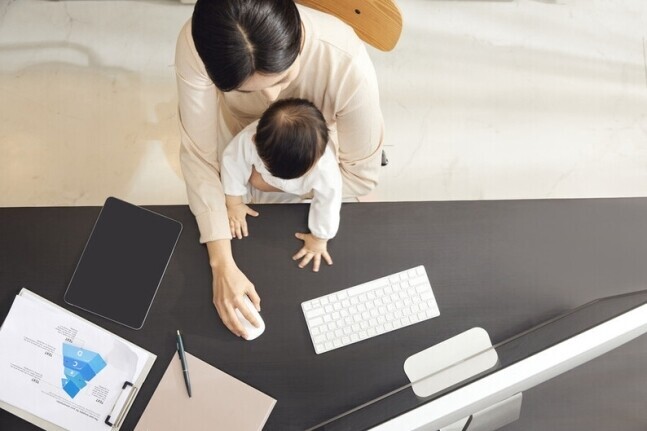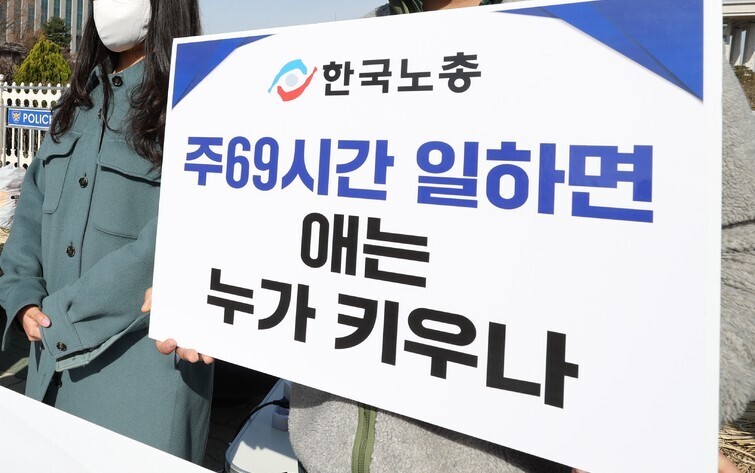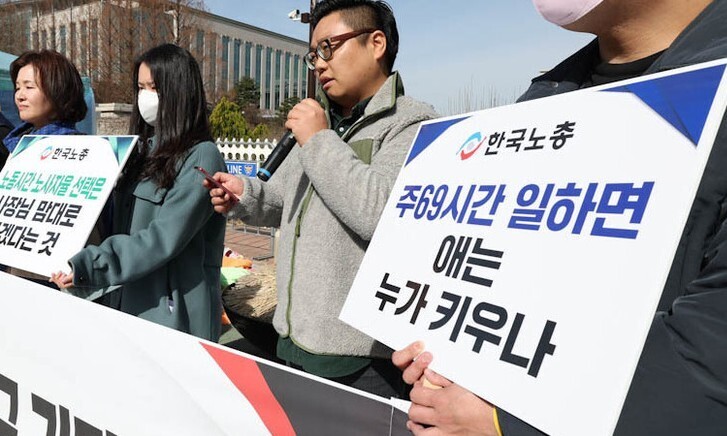hankyoreh
Links to other country sites 다른 나라 사이트 링크
Working parents in Korea ask when they’re supposed to raise kids during 69-hour week

“Just because a mother is busy doesn’t mean she can wait to feed her baby later or put it to sleep without a bath. Parenting is not something you can push off to do all at once.”
A woman surnamed Kim, 35, is on maternity leave after giving birth to her son last year. However, she is perplexed ahead of returning to work after hearing about the Yoon Suk-yeol administration’s plans to reform the workweek system.
Kim works for a public corporation in Gyeonggi Province and works a lot on weekends due to her duty of overseeing services for local residents. She is concerned not just for herself but also for her husband, who works as an indefinite-term contract worker in the financial sector. She fears longer working hours will make caring for their child much more challenging.
“Departments that allow working hours to be freely adjusted are highly competitive within the company, so if you go to them for childcare reasons, you won’t be viewed in a great light,” Kim says.

“It was very common for me to not be properly paid even after working for more than 52 hours a week before I went on leave,” Kim said, adding, “If working hours are increased then I can’t imagine still going to work while having to raise a baby, so I am seriously considering leaving my job.”
On March 6, the Ministry of Employment and Labor explained, “Depending on the preference of the worker, it is possible to work four or four-and-a-half days a week and in the case of dual-income couples, their work-life balance will be improved such as through adjusting commuting times to help their children get to and from school and academies.”
But workers with children criticized the government’s plan in interviews with the Hankyoreh, calling the plan a “vain discussion with no knowledge of what parents actually go through.”
Parents initially expressed that the work atmosphere is not one where they can freely choose working hours taking into consideration their childrearing situation.
One woman surnamed Jeong, 37, is a salesperson for a large pharmaceutical company and gets home well after 10 pm once or twice a week due to the nature of her work. On days when she has to work late, if her husband also has to work overtime on the same day, then he has no option but to work from home while taking care of their 3-year-old.
“My husband is very involved in childcare and we are getting by with the help of my parents, but if this weren’t the case, I would have no choice but to quit my job,” Jeong said. "My son is so adorable and lovable, and sometimes I want to have a second child, but I can't imagine how it’d work in the current situation, so I have no choice but to give up on the idea,” Jeong added.
Even in the government’s reform plan, there’s not enough consideration for the separate time that goes into childcare. On March 13, the Ministry of Employment and Labor posted promotional material about the plan on social media. One of the photos showed a mock working schedule reading “overtime, overtime, overtime, passing out” that had been making the rounds online and rhetorically asked if the hours were realistic.

Although the work schedule examples posted by the ministry were meant to clarify the government’s plans in response to public criticism, the schedules showed working hours till 9 pm from Monday to Friday and until 8 pm on Saturdays. This resulted in even more backlash, with people asking when they’re supposed to take care of their children.
According to working parents, even if they send their kids to daycare or preschool, they still need at least four to six hours every day to feed, bathe, dress, and put their children to sleep. In other words, working 52 hours a week while also raising a child would result in a total workload greatly exceeding 70 hours per week. Moreover, this “second shift” of childcare work is being passed on primarily to women.
For real work-life balance, the total amount of working hours must be reduced while increasing the predictability of when someone has to be on the clock. The government’s plan promoting concentrated work for a specific period of time, however, is a move in the opposite direction.
In fact, the reality of the difficulty of working while raising children can lead to people avoiding marriage and giving up on having kids altogether.
"Children eat at a fixed time and go to school at a fixed time, so childrearing work is never flexible,” says Jang Ha-na, director of Political Mamas.
“Even with the current 52-hour week (including overtime), there are many cases where one parent has to quit their job because the couple is unable to raise their child with both parents working,” Jang added, calling for the government’s workweek reform plan to be stopped since it “goes against the people’s demands to have working hours reduced.”
By Lee Jae-ho, staff reporter
Please direct questions or comments to [english@hani.co.kr]

Editorial・opinion
![[Editorial] Penalties for airing allegations against Korea’s first lady endanger free press [Editorial] Penalties for airing allegations against Korea’s first lady endanger free press](https://flexible.img.hani.co.kr/flexible/normal/500/300/imgdb/original/2024/0502/1817146398095106.jpg) [Editorial] Penalties for airing allegations against Korea’s first lady endanger free press
[Editorial] Penalties for airing allegations against Korea’s first lady endanger free press![[Editorial] Yoon must halt procurement of SM-3 interceptor missiles [Editorial] Yoon must halt procurement of SM-3 interceptor missiles](https://flexible.img.hani.co.kr/flexible/normal/500/300/imgdb/child/2024/0501/17145495551605_1717145495195344.jpg) [Editorial] Yoon must halt procurement of SM-3 interceptor missiles
[Editorial] Yoon must halt procurement of SM-3 interceptor missiles- [Guest essay] Maybe Korea’s rapid population decline is an opportunity, not a crisis
- [Column] Can Yoon steer diplomacy with Russia, China back on track?
- [Column] Season 2 of special prosecutor probe may be coming to Korea soon
- [Column] Park Geun-hye déjà vu in Yoon Suk-yeol
- [Editorial] New weight of N. Korea’s nuclear threats makes dialogue all the more urgent
- [Guest essay] The real reason Korea’s new right wants to dub Rhee a founding father
- [Column] ‘Choson’: Is it time we start referring to N. Korea in its own terms?
- [Editorial] Japan’s rewriting of history with Korea has gone too far
Most viewed articles
- 160% of young Koreans see no need to have kids after marriage
- 2Presidential office warns of veto in response to opposition passing special counsel probe act
- 3Months and months of overdue wages are pushing migrant workers in Korea into debt
- 4[Editorial] Penalties for airing allegations against Korea’s first lady endanger free press
- 5Japan says it’s not pressuring Naver to sell Line, but Korean insiders say otherwise
- 630th anniversary Wednesday Demonstration pushed out of memorial site by far-right
- 7OECD upgrades Korea’s growth forecast from 2.2% to 2.6%
- 8At heart of West’s handwringing over Chinese ‘overcapacity,’ a battle to lead key future industries
- 9[Reporter’s notebook] In Min’s world, she’s the artist — and NewJeans is her art
- 10[Special reportage- part I] Attending the funeral of the victim of a South Korean war crime in Vietn